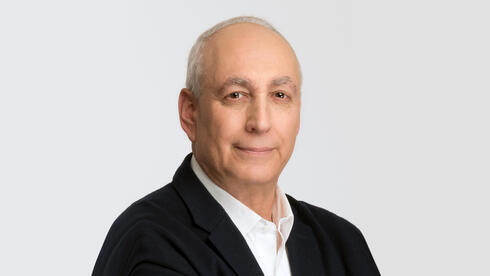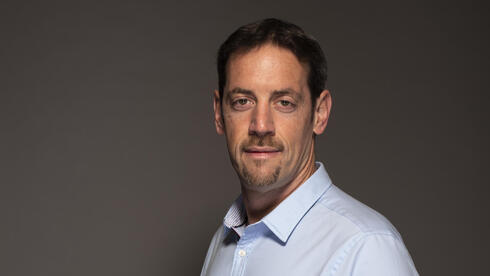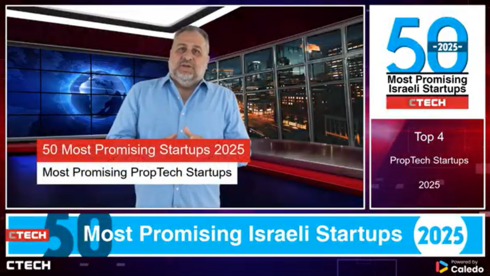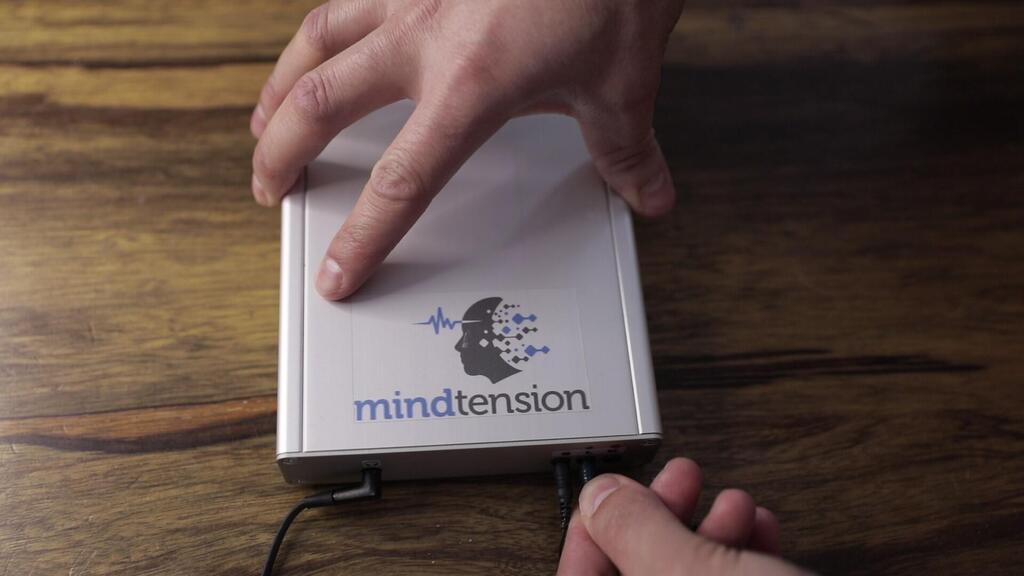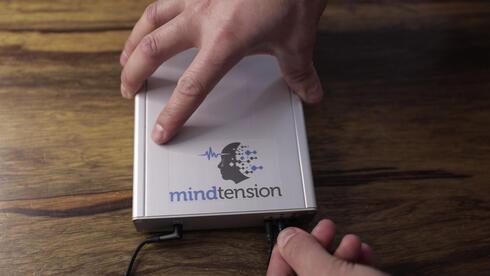
Boarding Pass
“There is a $5 billion opportunity in the ADHD market”
MindTension has raised a total of $2 million for its tool helping diagnose and treat optimization of ADHD and related mental health comorbidities
“It is estimated that 10% of the world's population suffers from ADHD,” explained MindTension. The company, which was founded in 2020 by Zev Brand and Prof. Avi Avital, is aiming to offer a computerized solution that measures the reflexive response of the brainstem to auditory sounds. It is understood that MindTension’s technology can determine the precise level of attention deficit for precise treatment.
The company continued: “This technology can also be used in the ‘fit to operate’ space, to assess the attention of professionals who require high levels of attention in order not to cause terrible damage or loss of human life, e.g. drivers, pilots, surgeons, and heavy machinery operators. Both clinical and non-clinical applications open up massive new untapped markets.”
MindTension joined CTech for its Startup Boarding Pass series to share how the company plans to tap into a $50 billion opportunity.
Company Name: MindTension
Sector: Healthcare, AI, Work Safety, Fit to Operate
Product/Service description:
MindTension is a digital health and medical device company that has developed a revolutionary way to accurately quantify attention physiologically, reflexively, and objectively. Our mission is to provide patients and physicians with a simple and straightforward novel tool for the diagnosis and treatment optimization of ADHD and related mental health comorbidities. Our game-changing technology can also be used to measure immediate attention level at a specific time, which brings a ground-breaking approach to the work safety and FTO (Fit To Operate) fields in high-risk, high-attention professions (pilots, surgeons, drivers, and more).
Founder Bios:
Zev Brand - Co-Founder and CEO of MindTension
Prof. Avi Avital - Co-founder and advisor, Head of the Behavioral Neurobiology Lab, University of Haifa.
Year of Founding: 2020
Last Investment Round: $750,000
Last Investment Stage: Pre-Seed
Date of Last Investment: July 2021
Total investment to date: $2 million
Investors (leading and all): Galia Kut's Family Office, Arazim Ltd, and the Israeli Innovation Authority
Current number of employees: 6
Open positions: Marketing Specialist, Regulatory Specialist.
Social Media:
https://www.linkedin.com/company/mindtension/
How was the idea born?
Zev Brand, Mindtension’s CEO, worked for many years in the fields of artificial intelligence and algorithmic development. In 2015 he enrolled in a Ph.D. program at The Technion, where he met Professor Avi Avital, a neuroscientist who had spent years finding a way to precisely evaluate human attention. Zev and Avi had observed the inefficiencies that arose from a lack of precise ADHD diagnostics. ADHD patients and their doctors often spent months and sometimes years to arrive at a correct diagnosis and in the meantime, patients suffered and the healthcare system incurred unnecessary exorbitant costs. As a solution to this, Avi and Zev developed an unprecedented method of quantifying attention, to ensure precise ADHD diagnosis and treatment.
In 2020, MindTension was established. To validate the initial prototype MindTension conducted a large clinical trial in Israel at Geha Mental Health clinic under the expertise of one of Israel’s top ADHD psychiatrists, Prof. Iris Manor. The solution was received with immediate enthusiasm from the global ADHD community. Late Professor Biederman from Harvard University and former board member, described MindTension as a “game changer”. Professor Newcorn from Mount Sinai Hospital in New York, another key opinion leader, was so impressed that joined the scientific board. The unveiling of the solution at the World ADHD conference in May 2022, generated enthusiasm both from investors and potential partners who noted the clear competitive edge of this company.
What is the need for the product?
It is estimated that 10% of the world's population suffers from ADHD. ADHD is diagnosed using tests with inherent subjective biases, such as questionnaires and interviews. The computerized solutions that attempt to increase the objectivity of the diagnosis depend on the patient's voluntary cooperation and engage complex neurological activity, from which it is difficult to obtain a sufficiently specific measurement, and even after diagnosis, treatment adjustments are based on trial-and-error processes.
Our technology is based on measuring the reflexive response of the brainstem to auditory sounds. This is done by tracking micro-movements of the orbicularis oculi muscle around the eye, which moves reflexively in response to various sounds. Based on the depth of the eye reflex movement, MindTension’s technology is able to determine the precise level of attention deficit for precise treatment. The solution is reflexive, physiological, objective, fast, and accurate. This is currently absent in the physician’s toolbox.
ADHD diagnosis is the company’s primary application.
Secondary applications extend beyond the clinic. This technology can also be used in the “fit to operate” space, to assess the attention of professionals who require high levels of attention in order not to cause terrible damage or loss of human life, e.g. drivers, pilots, surgeons, and heavy machinery operators. Both clinical and non-clinical applications open up massive new untapped markets.
How is it changing the market?
This technology will disrupt the following markets:
- Payors, MindTension’s main customers, will reduce exorbitant costs that are directed into reimbursing for endless medical appointments that need to occur until the patient is accurately diagnosed. A process that could previously take years can now take place within weeks.
- Providers will obtain an exact ADHD diagnosis so that they can quickly and swiftly move to decisions on treatment. With MindTension’s unprecedented ability to detect exactly how attentive or inattentive a patient is on the ADHD spectrum, doctors will be able to prescribe and monitor drug treatment with precision. Physician frustration will be reduced as they will be able to treat patients in the most efficient way and shift other patients into time slots that would otherwise be reserved for current ADHD patients requiring multiple tests and trial-and-error adjustments. The MindTension test takes five minutes, a fifth of the time for the standard computerized tests that already exist on the market, which will increase the doctor’s efficiency even more and be easier for patients who find it difficult to sit through lengthy cooperation demanding tests.
- Patient suffering will be reduced as they will be treated quicker than usual. Children will be able to focus at school and will readjust socially. Adults will become more functional both in the workplace and personally. MindTension’s test, contrary to the competitor tests, also offers the ability to spot comorbidities easily, e.g. emotional dysregulation which requires its own special drug protocol, different from ADHD.
With regard to its secondary applications (namely testing the attention of those engaged in dangerous work), MindTension taps into a blue ocean where almost no attention-detecting technologies exist. This can save billions of dollars in terms of reducing costs of road accidents, insurance premiums for airlines, and malpractice suits where doctors are not operating at peak attention.
How big is the market for the product and who are its main customers?
In the clinical ADHD market, we are targeting payers as the main customers as they are the ones that pay/reimburse for medical procedures and tests. By reimbursing for MindTension’s test, payers will reduce their claims substantially and see significant cuts in reimbursement fees.
In order to get payers on board, providers will be our promoters as they actually diagnose ADHD and functionally understand the inefficiencies of the process. A complete ADHD diagnosis typically entails three subprocesses:
- An interview
- A questionnaire, and
- A computerized test to test executive functioning.
Our solutions tackle the current inefficiencies of current computerized tests.
The current tests available take an average of 25 minutes, are complex, and require voluntary cooperation which contaminates the findings. For this reason, only 10% of the providers in an attempt to diagnose ADHD actually use computerized tests.
This 10% is our target market of current users familiar with testing who will obtain a much more accurate and quick test. However, the real blue ocean market lies with the remaining 90% that don’t use computerized tests for reasons cited above. As soon as these providers recognize the efficiency and precision of the diagnosis obtained from using our test, we plan to target the other 90% aggressively and are confident that the need for our solution will profoundly improve provider performance. In the ADHD market, there is a $5 billion opportunity.
In the fit-to-operate market (truck drivers, pilots, machinery operators, surgeons), there is a wide blue ocean. We have estimated a $50 billion opportunity. Our main customers here will be insurance providers who have it in their best interest once again to cut premiums for malpractice suits and accidents at work.
Does the product exist already? If not - at what stage is it and when is it expected to hit the market?
We have a perfectly functioning prototype that has been used in clinical trials very successfully and the algorithm continually improves as we feed it with more and more data.
The solution comprises a medical device that plays auditory sounds into a headset. An EMG is placed under the eye to measure the response of the orbicular muscle (blink/startle response) to these sounds. The extent of the blink response determines the level of attention deficit. This information is fed back into the cloud where our algorithm identifies the exact extent of attention deficit, enabling the provider in the ADHD case to prescribe the exact amount of medication. Our second-generation product will be wireless and operated via sensors and cameras.
In the “fit to operate” application, we are not focused on a clinical outcome but rather showing a “point in time” outcome, which determines whether an individual is fit to work based on their level of attention. Our studies have shown that lack of sleep, alcohol, and drugs have similar temporary adverse effects on attention that very strongly mimic ADHD at that given point in time even though it will not and should not necessarily be diagnosed as a chronic clinical disorder. Once a person’s attention levels are defined as subpar, they should not be allowed to drive a truck, conduct a surgical operation, fly a plane or operate heavy machinery.
Until we obtain regulatory approval (FDA/CE), we will not be able to hit the market officially and sell. We are aiming to do our first sales in Q4 2024 following trials at a tier-one university like Harvard or Mt Sinai where our KOLs have already expressed great enthusiasm about our solutions.
Who are the main competitors in this sector and how big are they?
In the ADHD diagnostic space, our first main application and target market, there are several competitors that provide computerized tests and function as our primary competitors even though they only service 10% of the market. Since most professionals find their indication to be not accurate or physiological enough. The main competitors are TOVA, Qbtech, and Neurotech (MOXO).
In the FTO operating space, there are not many competitors at all but a few do exist: In the driving space, there are a few companies that use sensors and cameras to recognize when the vehicle operator is incapacitated – dozing off or is suffering a cardiac arrest. They alert with a warning and if not heeded, the car takes over and drives the vehicle to a safe place. DREM for Hyundai is one such example. There are often false alarms with this technology. We believe that our technology which measures attention before work (driving, doing surgery, etc.) is more important to prevent human death and massive cost bleeding.
What is the added value that the founders bring to the company and the product?
Co-founder CEO, Zev Brand has 20 years of experience in algorithmic design, computer vision, and strategic leadership acquired during his tenure at leading Israeli companies.
Co-founder and advisor Avi Avital is a Neuroscience Professor who developed the original algorithm at The Technion. He is deeply immersed in the world of scientific validation and is well-recognized internationally in his field.
What will the money coming in from the round be used for?
The funds will be used to run clinical trials at a tier-one academic institution like Mt Sinai or Harvard University. They will also be used to grow the team, solidify partnerships and POCs, and continue developing the hardware and proprietary algorithm.
In the "Startup Boarding Pass" section, CTech will cover the (relatively) small investments made in companies during the early stages of their existence - and the entrepreneurs and startups who have not yet had the opportunity to reveal their stories to the world. Please use the linked form and fill it out according to the guidelines. This form is intended for startups raising between $500,000 and $3 million from venture capital funds, angels, or official grants from Israeli and foreign institutions. If relevant, someone at CTech will be in touch for follow-up questions.




